Individuals working in social change are solving the most complex problems humanity faces, often in resource constrained environments. For many, this work takes a toll on their physical, mental, and emotional health. The COVID-19 pandemic, which has brought an economic slowdown and increased requests for support from frontline responders, has exacerbated these conditions. It has forced social change organizations to make the difficult decisions, including shutting down programs, laying off staff, and reducing wages.
Amid growing demand for support and ever-changing circumstances, it’s more essential than ever for individuals in the field of social change—and especially the ones on the frontlines—to tend to their well-being.
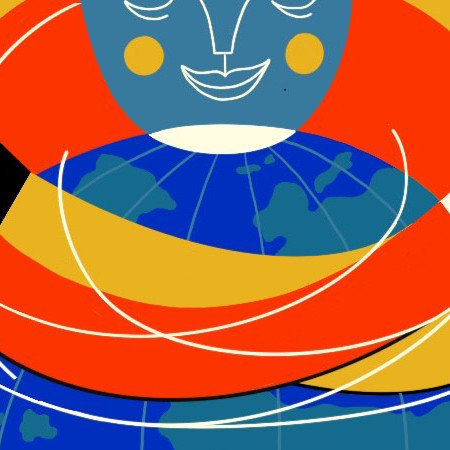
Previous articles in this series, Centered Self: The Connection Between Inner Well-Being and Social Change, have provided an understanding of well-being, highlighted the importance of individual well-being for effective social change, and shared various ways funders can support the well-being of grantees. Articles have also explored the relationship between individual well-being and organizational well-being, and provided tips for leaders to integrate well-being into their organizations.
In solidarity with artists and in partnership with Amplifier Art, The Wellbeing Project launched a global open call for art that promotes the value of well-being and the work of social change, and recognizes the extraordinary efforts of nurses, community workers, and teachers on the frontlines. The call asked artists to both inspire and lift up language related to mental health and well-being, and to imagine the safe and meaningful world we know is possible on the other side of the COVID-19 pandemic.
Artists from all over the world responded with 10,000 submissions, from which judges selected 57 finalists. All artwork was judged by senior members of the arts community—including Nancy Spector, artistic director and chief curator at the Solomon R. Guggenheim museum, and Vicente Todoli, former director of the Tate Modern—and screened for appropriate mental health and well-being messaging by members of the health community. The images here are accompanied by artist statements submitted in the spring of 2020 and represent the campaign’s major themes: self-care, kindness, togetherness, and hope.
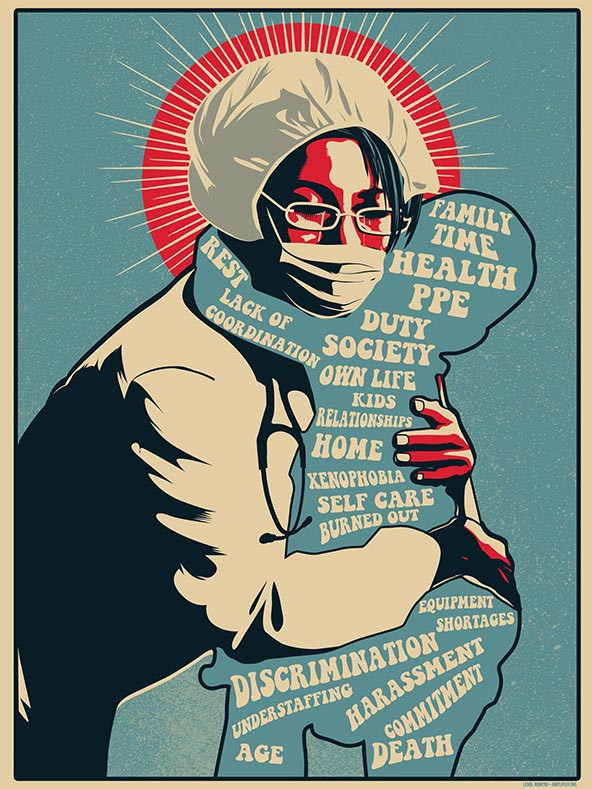
“Sacrifice,” Lendl Romero, Quezon City, Metro Manila, Philippines
A greater risk of everything in life is what our medical people are willing to sacrifice, fighting this life-threatening pandemic. Most countries are not prepared, and it comes with a price. My art speaks of everything lacking in our health care system. We may get through this soon, but we need to provide them the liberty and support they need. To our frontliners, we salute and pray for the strength you put in, despite the lack of measures of our government.
“Find Your Peace,” Bee Harris, Chicago, Illinois, United States
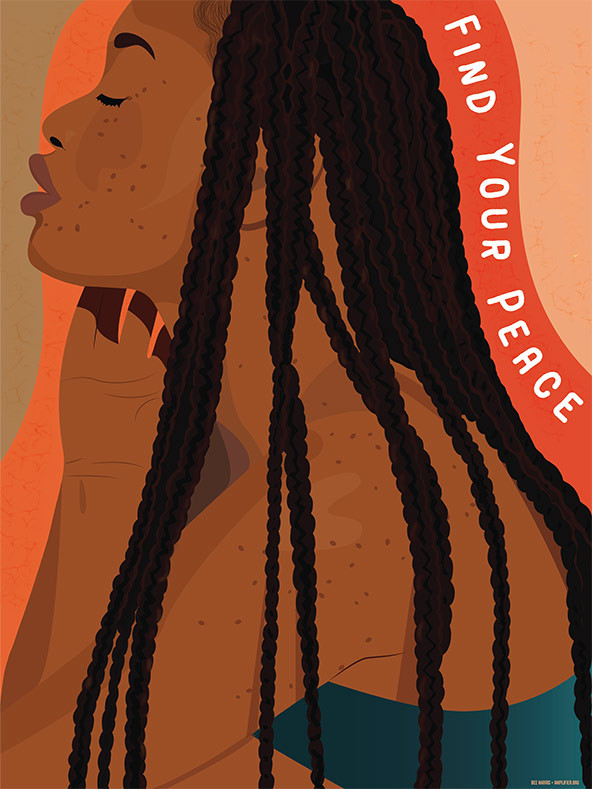
This moment in time has heightened the anxieties of many people around the world. Now more than ever, it’s important that we look inward, and focus on the things that bring us joy and peace.
“Apart Yet Closer Than Ever,” Bonnie Brown, Wellington, New Zealand
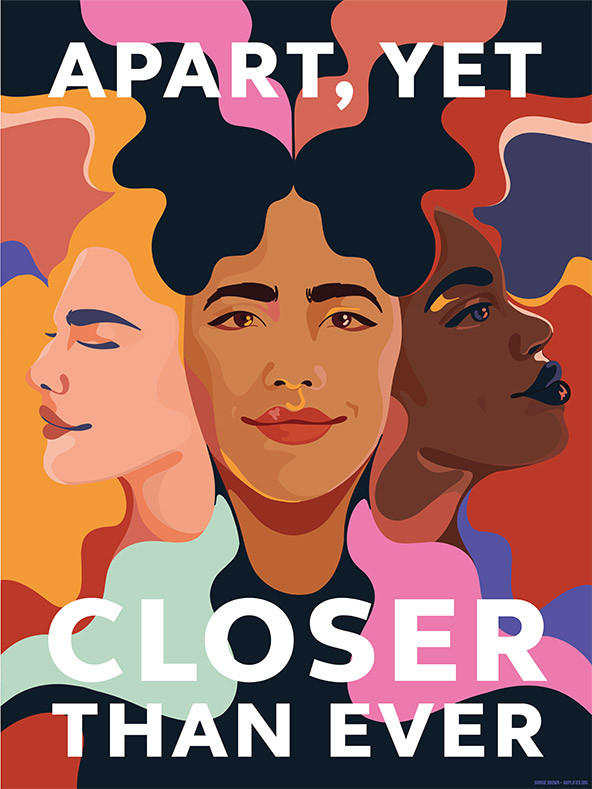
Heading into our sixth week of lockdown in New Zealand, I’ve been feeling physically distant from those around me, yet closer than ever mentally—from waving to my neighbors from my balcony to catching up with childhood friends. When we leave lockdown it’ll be with a new sense of community, hope, and optimism.
“Spread Love,” Skye Sturm, Como, Lombardy, Italy
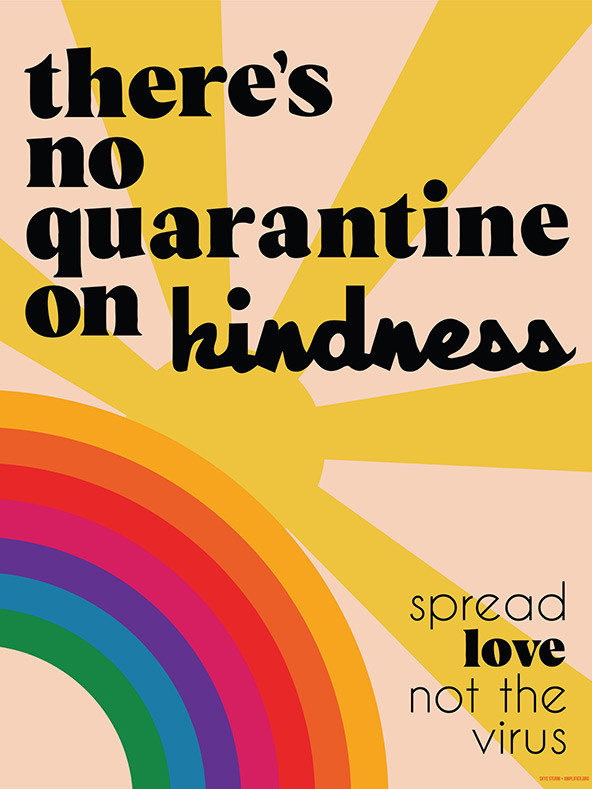
I created this artwork, because I wanted to celebrate all of the acts of selflessness and kindness, both big and small, that we have seen during the pandemic. But I was also seeing so much hatred and blame. I wanted to remind people to withhold judgement, to remember that we are all in this together and that a little kindness goes a long way. Even wearing a mask and maintaining distance is an act of kindness and respect to those around us. I chose the rainbow and sunshine as a bright and positive backdrop to the message—the symbol of hope, of rays of sunlight which shine through in a dark storm. I hope this message can help people to stay positive, and that it encourages everyone to spread a little love in these difficult times.
“Mind Aware, World Awake,” María Toro, Medellín, Antioquia, Colombia
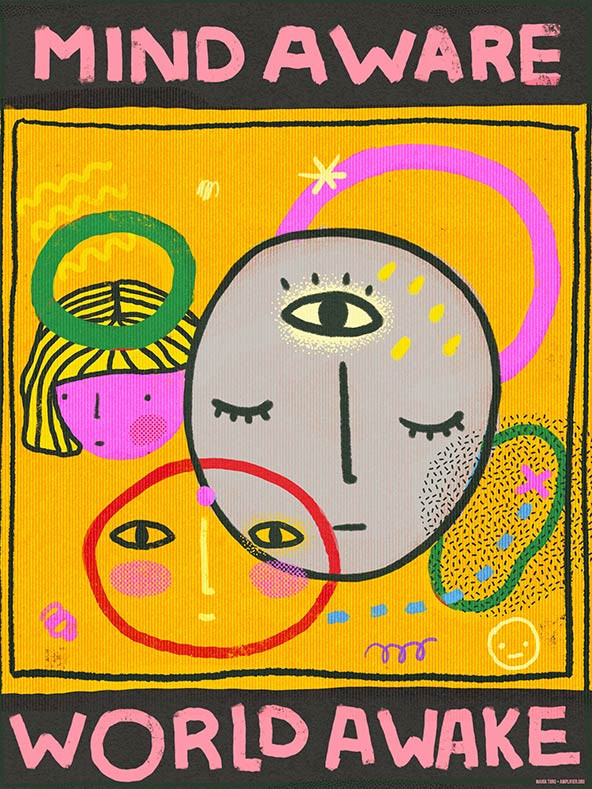
If we all connect our minds and stay aware, the world will wake up.
“COVID Compassion,” Cam Watts, Auckland, North Island, New Zealand
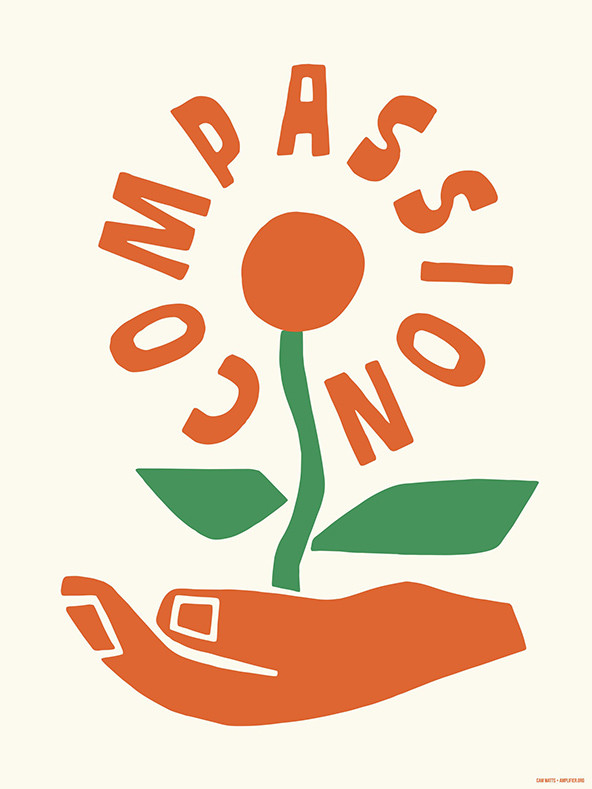
We can’t offer each other our hands, but we can cultivate our compassion garden and be there for each other in other ways during these trying times. Compassion for the sick, the fearful, the jobless, the old, the young, and the alone. We are all being challenged in different ways right now, and compassion for each other is of the utmost importance.
“Self Care,” Kimberly Ashby, Philadelphia, Pennsylvania, United States
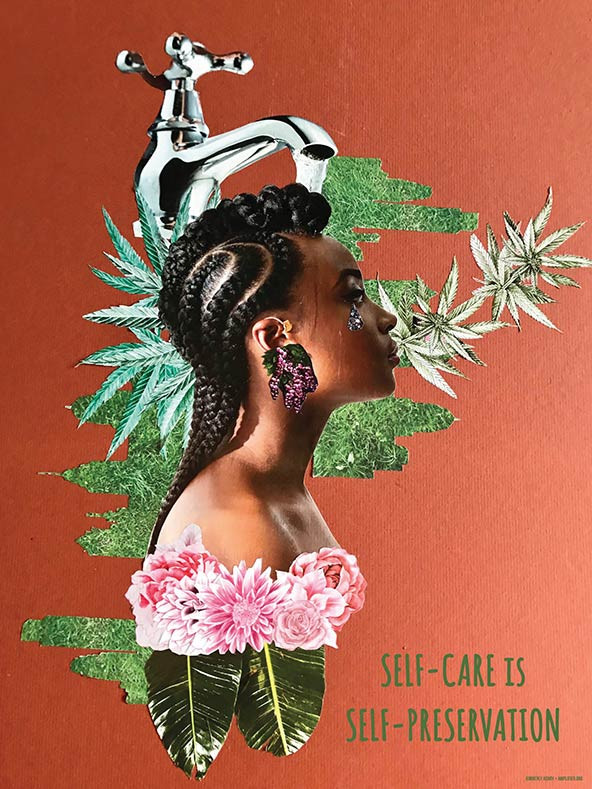
Kimberly Marie Ashby is a Black and Native American, queer, woman artist, activist, and doctoral candidate in counseling psychology. Kimberly creates hand-cut collages through an Afrofuturist lens, using found materials to reflect marginalized people’s ability to make marvels out of the scraps they are given. Kimberly created this hand-cut collage to express the importance of self-care, particularly for Black and Brown people in the United States who are being disproportionately impacted by COVID-19.
“Spread Compassion,” Lisa Vollrath, Euless, Texas, United States
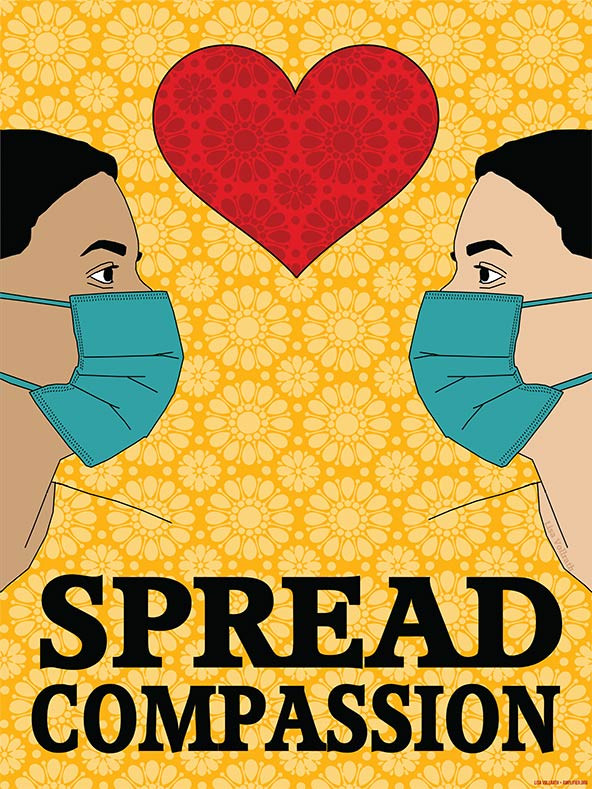
I see nerves getting frayed from all the staying home and little inconveniences of our new day-to-day life. I always try to remember to spread a little laughter when I go out, even if I’m not feeling particularly happy. The world isn’t all about me, and it’s good to have a little compassion for the folks around us right now.
“Breathe,” Anirudh Kadav, Mumbai, Maharashtra, India
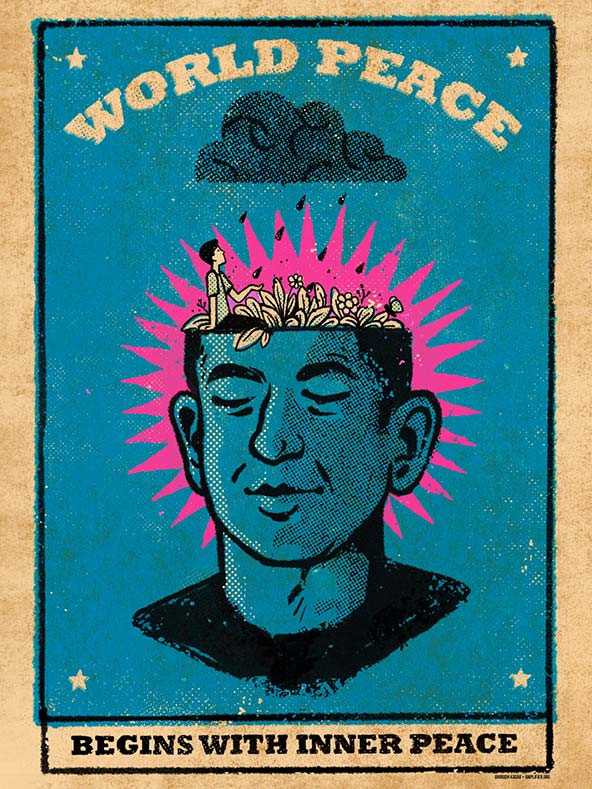
The nearer a man comes to a calm mind, the closer he is to strength. In my opinion, mental health is the most overlooked aspect of human nature. Seldom we give it the attention it deserves. No amount of wealth guarantees one’s well-being, and the current global scenario is a reflection of the same. At the moment, when the world is facing a what seems to be an immortal enemy, no amount of wealth or militia is enough to fight it. In these times, when people are forced to be at home, take a step back and reflect. As much effort is being put into maintaining and enhancing physical strength, try and focus on your inner peace as well. What makes you happy? A question to which most of us have an answer to, but rarely do we act on it. We have always been too preoccupied with things and troubles, which now do not seem to matter as much. So let’s take a deep breath, and focus on what is more important—you. Be the change you wish to see in the world. World peace begins at inner peace. Stay positive. Stay home. Stay safe.
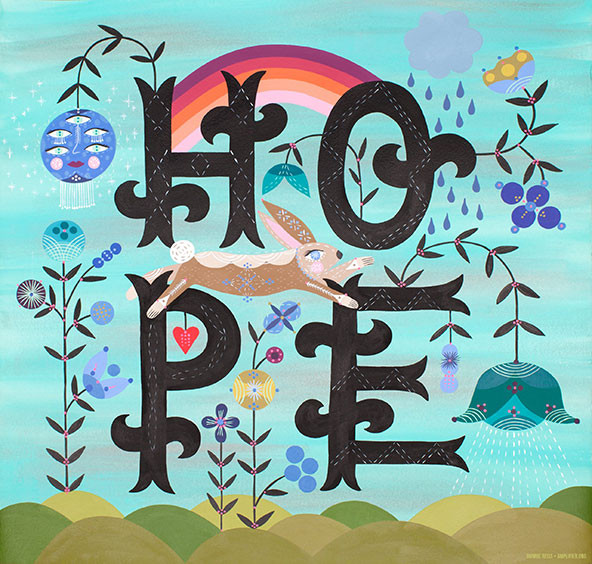
“Hope,” Bunnie Reiss, Los Angeles, California, United States
I created these posters as a way to connect with the world during a time of such complete isolation. My hope is that they help others see the light at the end of the tunnel—the only real way for us to get through this is together.
“The Care Club,” Nana Daye, Te Whanganui-a-Tara, Aotearoa, New Zealand
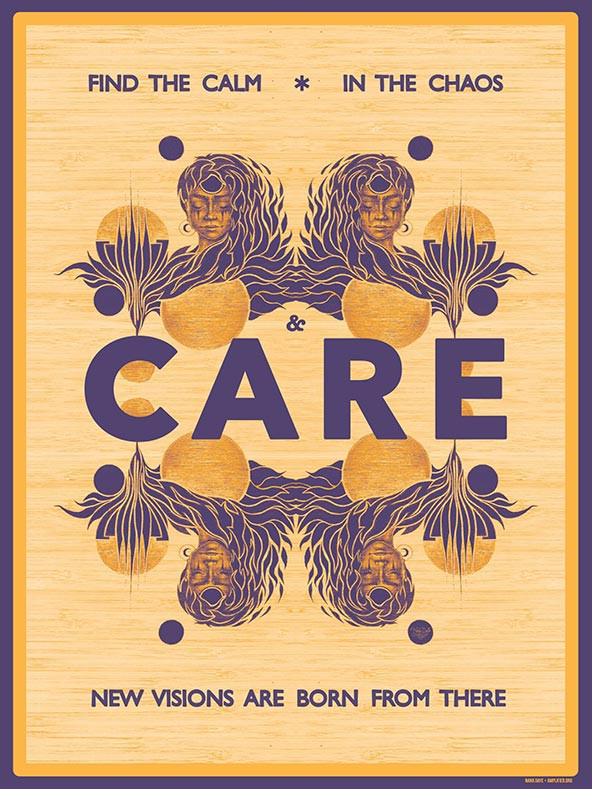
A provocation for care in all arenas. Whether it is for one’s personal needs, communities, or creative visions at large. Care will drive you there and blossom into conscious resolves.
“Good Days Not Far Away,” Varshini Ramakrishnan, Chennai, Tamilnadu, India
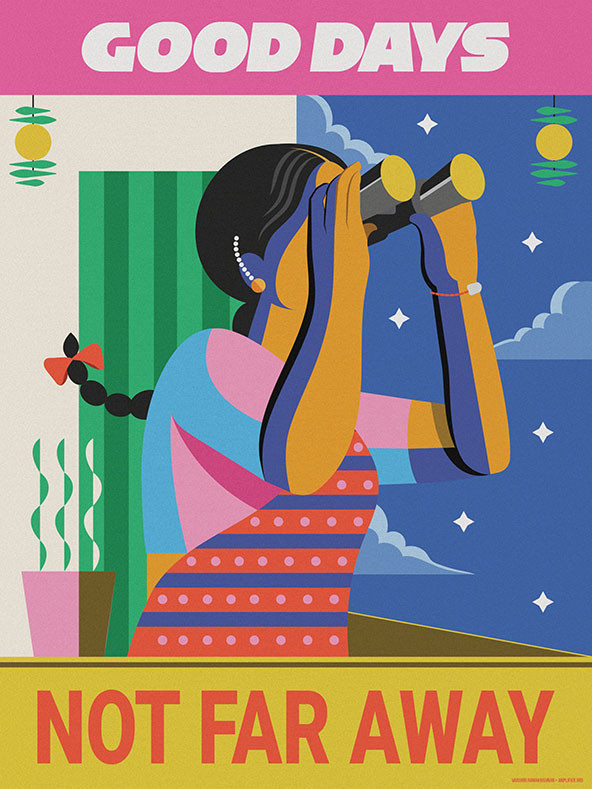
It’s time to manage the voice of the media and take control of the voices inside our heads. The media content we’ve been consuming since COVID-19 has taken a toll on our thoughts and emotions. We feel the urge to stay up to date on the current happenings and tend towards negativity. This artwork is inspired by vintage advertisements, portraying the importance of a mental cleanse. Visual media like advertisements, cinema, etc. have always been part of our mental growth. I visualize the voice of media to be more positive and break stereotypes around mental illness.
“Nature Heals,” Troy Chafin, Portland, Oregon, United States
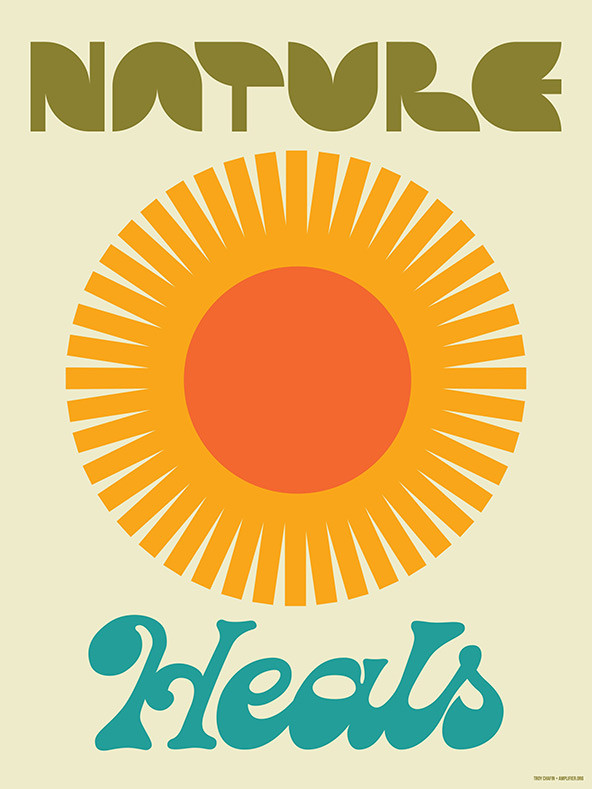
Nature (the sun, trees, plants, animals, and so on) is the greatest source of therapy for humans that has ever existed. Everything in nature is meant to heal us. In this age of isolation, yes, the world needs messages of action: staying in separation from each other and helping one another. But in addition to this, we all also need messages of calming hope. That everything will be OK. Get some sunshine on your face, and connect with your plants and pets inside your home.
“Let Yourself Rest,” Shirien Damra, Chicago, Illinois, United States
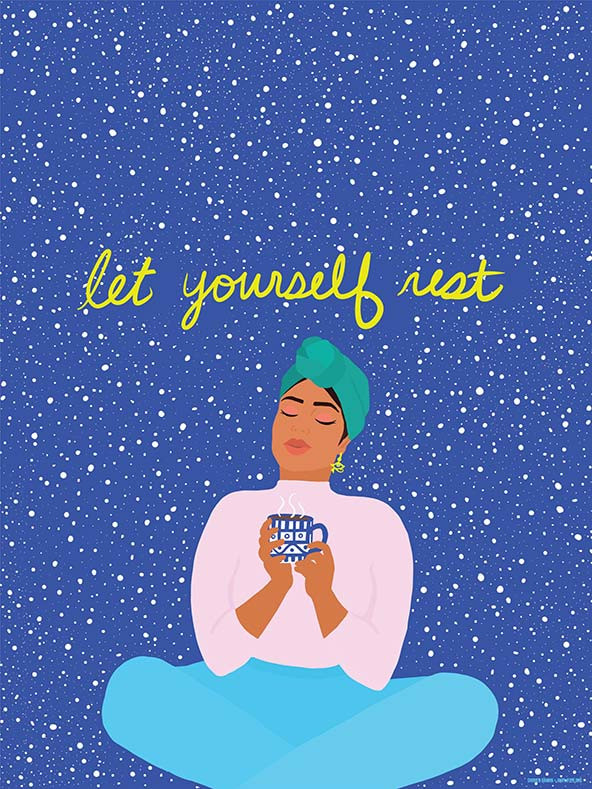
Capitalism tries to push the idea that we need to be productive. A lot of us feel like we need to constantly hustle and be on the grind to achieve our dreams. But giving yourself time to rest and take care of yourself is a gift that can empower you. It sounds counter-intuitive, but rest ultimately allows you to be in a stronger place to tackle whatever comes your way. We are in a global pandemic right now. It’s necessary to rest and breathe and check in with yourself!
“Take Care,” Danica Ricciardi, Cape Town, Western Cape, South Africa
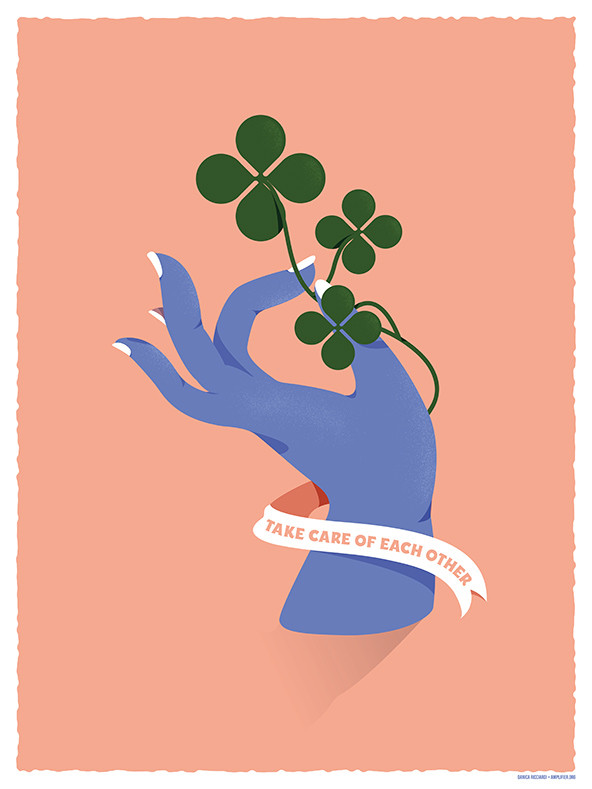
Protect each other and be kind!
Support SSIR’s coverage of cross-sector solutions to global challenges.
Help us further the reach of innovative ideas. Donate today.
Read more stories by Nancy Kapoor.

